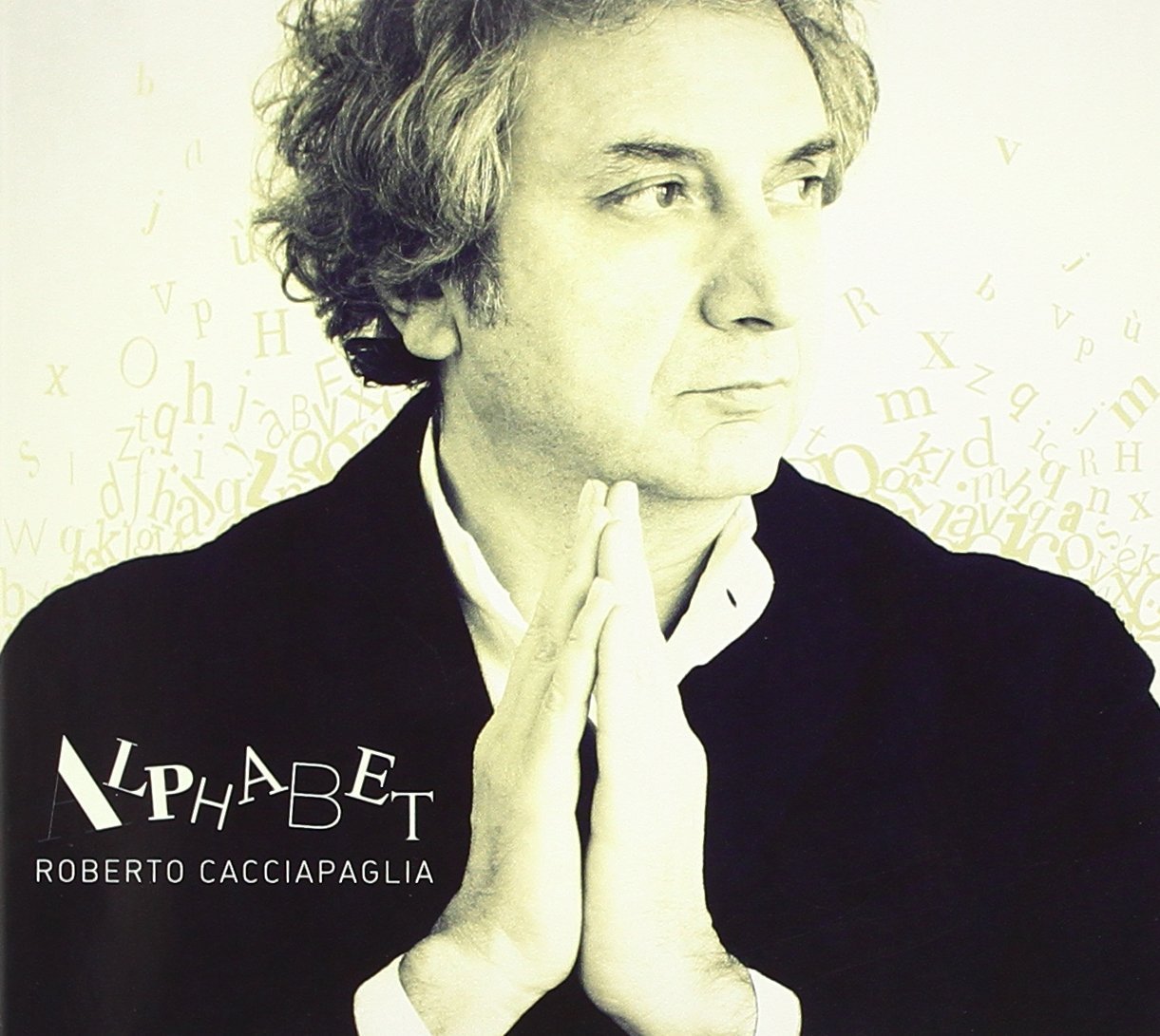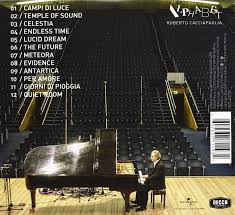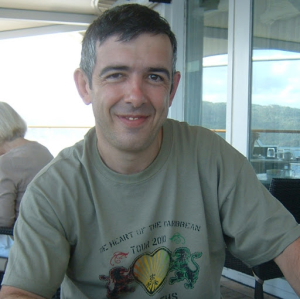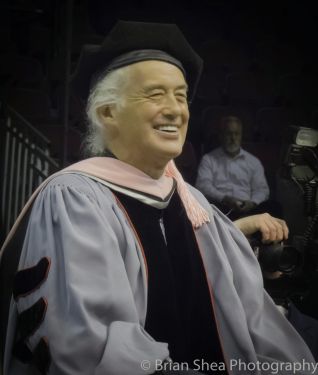
"...from my music, love can be created, but not intended as a physical thing, but more spiritual. Just the feeling of being a little instrument that brings love to the world..." ~Roberto Cacciapaglia.
When it comes to music in its globalism, no matter what genre it may be, it's the talent that makes the difference, leaving an unmistakable mark on the history.
Maestro Roberto Cacciapaglia from Milan, Italy is, without a doubt, one of those very rare people. Born with this built-in talent, the faculty of transmitting emotions and feeling that go beyond time and space is present, solely by playing his piano so beautifully.
Yours Truly is deeply honored today on behalf of Bluebirdreviews.com to have the Maestro with us, talking about his latest production, Alphabet, which is the natural follow-up to Ten Directions, his 2010's last album.
BBR - Roberto, Alphabet is such a delicate album that clearly comes from deep inside your emotions, as are all your previous records. How important has it been for you to record the album in such a royal location such as the Conservatorio G. Verdi in Milano, and how much of an impact has that given to the whole recording process?
RC - Very good question. The Conservatorio is perhaps one of the best environments in terms of acoustics we have in Italy, which has helped me to achieve fundamental aspects of the quality of sound I was looking for on Alphabet. I was looking for a true temple of sound and the Conservatorio is certainly one of those. On top of that, when I was younger, studying music at the time, such place as the Conservatorio has always been seen by me as a very special place, therefore I was and I still am very emotionally connected to it. We used twelve microphones with a very sophisticated sound system, two close to the piano and the rest all around the place when we recorded; This, in order to be able to capture even the most minute sound that, very often get slightly lost during the registration process of an album in an environment like that. Whilst I recorded at the Conservatorio, I could feel inside of me the energy coming from all the different artists that performed in a special place like that and that feeling has been for me really magic.
BBR - To make your audience feel the vibrations between the outside world and the Conservatorio was one of the tasks you set up for yourself before starting recording Alphabet; How do you manage, after all these years in the music business - to extrapolate the material to build this invisible bridge of vibrations through your phenomenal compositional talent?
RC - My objective was to make the piano, one of the most fundamental instruments in the history of our music, to meet a very sophisticated technology, very modern, that gives the opportunity to raise to the surface those harmonic, non-audible, those invisible sounds to make them audible and perceivable. A bit like imagining that such connection could allow the music to spray his rays of sun! During my concerts, I often use the analogy of throwing a rock into the water and this rock, bouncing on the water, forms a series of concentric circles that after a little while, we tend to lose and then vanish. The reality is, such circles, waves, they continue to expand in an invisible way and that can be, as a concept, be compared to the sound I try to recreate, bringing those waves to the audience for a little further than the normal life cycle before they vanish through this complex sound mechanism that hopefully, we have achieved to create.
BBR - In the album you mentioned Franco Battiato, one of the most experimental musicians that, together with you, Italy has ever had in the last half a century. How do you live your friendship with Battiato, and how much of an impact has he given to the concept of the album?
RC - There was no real collaboration from Franco Battiato on the album; I just mentioned him in the credit due to the long lasting friendship we have had and have since I was 16 and for his inspirational work as an artist and a friend. Recently, I have been invited by him in one of his concerts in Catania, Italy, and it was really nice to see him again. He is an artist I admire a lot and often in the past we have worked together and experimented with new forms of music on some of my previous works and I hope we will do that again in future. On this album, we have in reality not collaborated at all; I just thought of mentioning him in view of what I mentioned before.
BBR - Roberto, looking back at your debut album Sonanze in 1974, How much do you feel your music style has developed and your approach changed in recording new music?
RC - Sonanze represents for me a very important work, having been, back in 1974, the first quadriphonic album released in Italy; I have played this album live later in the years in an ambience that I call "post-quadriphonic," because in reality, the sounds go round in the space, they move in the space and expand too. This sort of concept, the sound lifting and moving in the space itself, constitutes an invisible web that links it to the concept of Alphabet too. It has been a long path, from Sonanze to Alphabet, but I am extremely satisfied of the results I have achieved in all those years as an artist and developing the concept of sound in many different forms.
BBR- Roberto, is Alphabet a straight line that opens up to the infinite, or a curved segment that closes a musical circle in your personal musical journey?
RC - I never try to close, I always try to expand, with music especially; this is an art that needs constantly to be free, an extraordinary form of art that does not give indication, in comparison to many other forms of art which are wonderful but require indication and it is even more beautiful in view of this. It's like looking to a photograph; one can see the forms and the edges or reading the storyline in a book, the lyrics in a song.. These are forms of art [which are] very defined, while the music or sounds in general, played to an audience of 100 or more people, can be read and perceived in many different ways, depending by the listeners. Music is an art that unifies people and remains, at the same time, very individual and personal. For reasons as such, this form of art, which is very old and very modern at the same time, is unique and absolutely fascinating.
BBR - Music is somehow seen as a font of energy, both moral and spiritual; What is your personal process in using energy when you create a new record?
RC - Real beautiful questions you are asking me, thank you. The job of a composer is to transform sounds and musical codes in energy through space and through the transmission of sound, which become almost like highways of energy where to transmit sounds and communicate it to people. The process I use is to start, fundamentally, from silence, in this type of building journey of the sound; the silence becomes for me a calm sea, a platform from which sound raises. If I manage through silence to reach those sensations inside of me, then the sound that come out will be able to possibly manage to reach and contact some deep emotional feelings of who listen to my music and together we establish a communion, a communication through the sound.
BBR - Letters and numbers mixed together seem to create a unique code to decipher new music territories. Does Alphabet sum up this concept, in your opinion?
 RC - In cases like these, to write the words "The End" is never possible. Evolution is always on the move in time and space, thank God! The game, the repetitive movements, to explore and proceed ...The secret stands in the path you follow, musically speaking, more than reaching a point and an end. After all, the point we wish to reach is always the one inside of us, in the center of ourselves, never out of us. I hope this record represents a contribute to the path I was mentioning before through the music and re-discover the power of this great art through its properties and the potentialities of which we human being can benefit. Individually and socially, music can help, cure, through sounds, sounds which are also used in modern science as a medicine for the mind and body of us all, producing emotions that can reach cerebral points and heal people.
RC - In cases like these, to write the words "The End" is never possible. Evolution is always on the move in time and space, thank God! The game, the repetitive movements, to explore and proceed ...The secret stands in the path you follow, musically speaking, more than reaching a point and an end. After all, the point we wish to reach is always the one inside of us, in the center of ourselves, never out of us. I hope this record represents a contribute to the path I was mentioning before through the music and re-discover the power of this great art through its properties and the potentialities of which we human being can benefit. Individually and socially, music can help, cure, through sounds, sounds which are also used in modern science as a medicine for the mind and body of us all, producing emotions that can reach cerebral points and heal people.
BBR - You had, and still have, given to the music different shades of colors throughout your career, modelling and embellishing it like a great artist would do with a sculpture. What would you be without music, Roberto?
RC - Who knows! As long as we are careful not to use music as an obsessive form but just as a way to set us free and not dependent by it and be able to remain in silence too when needed. Before appreciating music, one must learn to appreciate silence, the peace and quiet and then the movement of the music that come from the silence itself. I don't know what I would be without music, but as long as music gives me freedom, the opportunity to explore in any stage or age in life its infinite possibilities and learn, explore them, no matter if one is 18-years old or 80, then I shall be feeling young and excited by the vast resources this art provide to us human being. A form of art that travel across time, space and age might be the best art ever and that is what I feel about music.
BBR - Art is something that never ceases to move, progress and develop through the history of the world. If in one hundred years somebody would read your name on an encyclopedia of modern art, what would you love to read next to your name to define precisely who you were as an artist?
RC - Difficult question to answer this, I would not like to feel like I am the best artist on the planet because I try just to express my art; maybe I would like that next to my name there would be written that from my music, love can be created but not intended as a physical thing but more spiritua
l. Just the feeling of being a little instrument that brings love to the world, would something that could make me feel real happy.
BBR - Roberto, thank you, it has been truly a honor talking to you.
RC - Thank you, Bluebirdeviews! Maybe one day I could ask to the creator of the site where the idea of such wonderful name came from!
Giovanni "Gio" Pilato for www.bluebirdreviews.com
P.S. "My mother kept telling me that during the day, "There are just two moments in which everything stops ... The wind, trees, the birds, the whole nature. And those moments are before dawn and after dusk. Moments of full suspension and silence." - RC
This thought really reflects fully the wonderful nature of an enormously talented artist and what a delicate, gentle soul like Maestro Cacciapaglia truly is. I would like to thank Gianpiero Dionigi and all at Studio Glance to make this interview possible and to the Maestro for his kindness.
 About Our Author: Giovanni "Gio" Pilato is Italian music writer, who has been living in UK since 2002. With an enormous passion for music, and life in general, his interest in the communications began at 11 years old. He worked briefly for local radios in his youth and did a one-off radio show on 2007 on the glorious BBC 6 Music Radio station in the United Kingdom. Gio started his freelance journalist career in 2012, with Italian artists, and is now mainly focusing on blues artists. To follow Gio Pilato and his radio show, Visit:
About Our Author: Giovanni "Gio" Pilato is Italian music writer, who has been living in UK since 2002. With an enormous passion for music, and life in general, his interest in the communications began at 11 years old. He worked briefly for local radios in his youth and did a one-off radio show on 2007 on the glorious BBC 6 Music Radio station in the United Kingdom. Gio started his freelance journalist career in 2012, with Italian artists, and is now mainly focusing on blues artists. To follow Gio Pilato and his radio show, Visit:
(RTL 102.5 Cool (Webradio)): http://www.rtl.it/Cool

